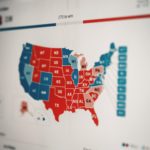 In commercial markets, customers tend to get better deals in environments where there is a decent amount of competition. Indeed, economists have traditionally thought that a handful of companies competing in a market is an optimum amount.
In commercial markets, customers tend to get better deals in environments where there is a decent amount of competition. Indeed, economists have traditionally thought that a handful of companies competing in a market is an optimum amount.
Research from the University of Arkansas highlights how this seldom applies in politics, however. Indeed, they highlight the growing number of US states that are effectively one-party monopolies.
Closed shop
The researchers examine data to understand the party political profile of each state. They were particularly interested in the party breakdown of the state legislature, the popular votes for both governor and president, and the congressional delegation, and gathered data on each indicator for every state from 1935 to 2020.
By averaging these values for any given year, they produced a score of between zero and one for each state depending on whether it was Republican (nearer to 0) or Democrat (nearer to 1). For instance, Arkansas consistently scored above 0.6, which would make it a Democratic stronghold, but this changed after 2009, and now it is just 0.18, which makes it one of the most Republican states in the country.
Such a change is unusually rapid, but the trend toward becoming a single-party monopoly was far more common. Indeed, most states heavily favored one party over the other for the best part of a century. Among the most uniform and longest-lasting of these monopolies are Kansas, South Dakota, and Wyoming on the Republican side, and Hawaii, Maryland, and Rhode Island on the Democratic side.
The data suggests that there was a sign of competitive resurgence in the 1990s, but this quickly withered away, and one-party monopolies are now the norm again.
“Most observers of American politics perceive this as a time of intense competition between the major parties for control of our governing institutions and, consequently, the direction of public policy,” the authors conclude. “That is not at all what’s actually happening in the elections that matter most: the states.”